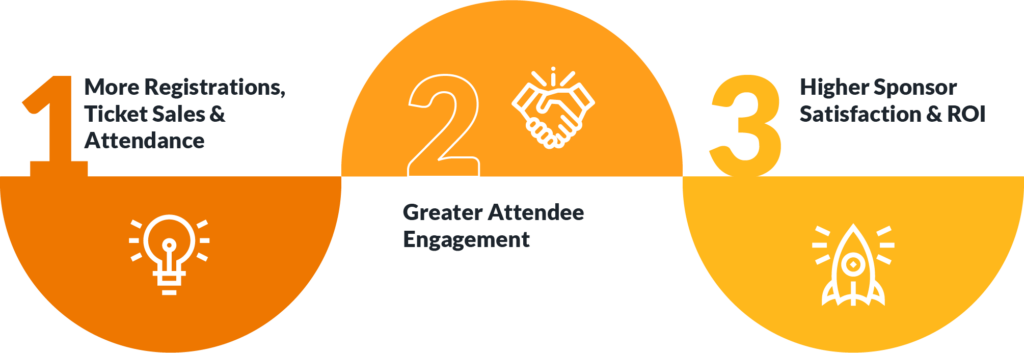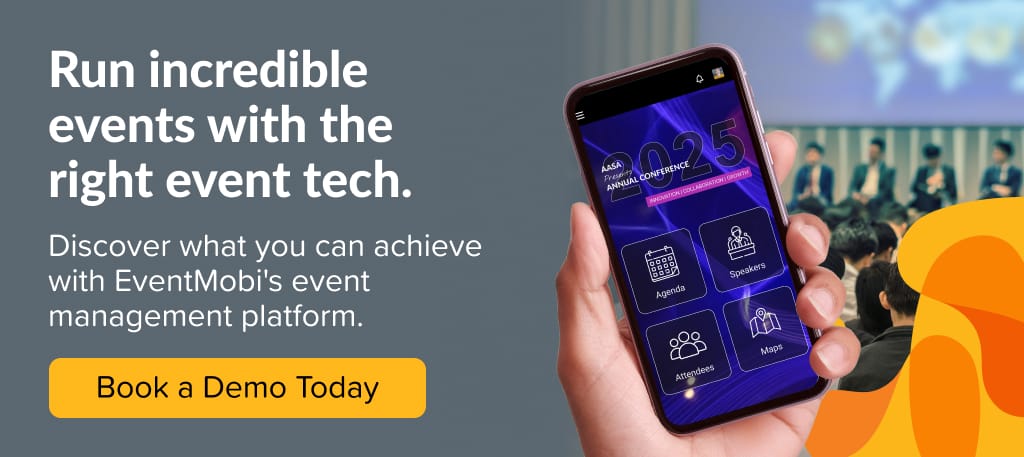Conference Management: What Event Organizers Need to Know
A well-planned and executed conference will do wonders for your organization.
Want to establish authority in your field? Generate quality leads for your sales team? Drive legitimate revenue? A conference can help you achieve these things—if you host it correctly.
To ensure your conference is a smashing success, invest in conference management. Doing so will lead to greater attendance, better experiences, and happier sponsors.
Keep reading this comprehensive guide to learn:
- What is a Conference?
- Common Conference Types
- Why is Conference Management Important?
- Conference Management Types
- The Conference Management Process
- How to Select the Right Conference Management Software
What Is a Conference?
A conference is a formal gathering that brings together like-minded people to discuss specific topics. Conferences usually take place over multiple days and require a fee to attend.

Oftentimes, conferences include keynote speakers and workshop sessions, each designed to educate attendees. Most of them give said attendees a chance to network with each other as well. Exhibitions and product demos are also regular occurrences.
While every organization’s goals are different, almost all of them host conferences for similar reasons: to connect with a target audience, generate leads, and drive revenue.
How Do Conferences Differ from Events and Conventions?
“Event” is a blanket term that includes everything from intimate weddings to mega industry get-togethers. (Like the annual Salesforce conference, Dreamforce, for example.)
Both conferences and conventions fall under the “events” umbrella. But conferences and conventions have a few differences you should know about.
As described above, a conference is usually a formal, multi-day event that allows attendees to discuss specific topics and network with like-minded individuals.
Conventions, on the other hand, are often larger than conferences and focus on entire industries or fandoms, rather than specific topics within said industries.
That said, conventions also aim to educate attendees via speeches, panels, and workshops. So the difference between conferences and conventions is about scope and content. Conferences are smaller and more focused. Conventions are larger and, at times, less formal.
Recommended Resource: Want to deliver amazing attendee experiences at all of your upcoming events? Watch this free Events Masterclass session, Event Apps 101: Your Playbook for Creating Engaging Event Experiences, for tips from industry experts!
Common Conference Types
There are many different conference types out there.
This is good because it gives conference organizers more ways to achieve their goals. Everything from academic conferences to virtual events is fair game.
But some conference types are more common than others. Here are the six kinds of conferences you’re most likely to see in the event industry:

Seminar
A seminar is a small, interactive conference. During the event, subject matter experts share information on a specific topic with attendees. This is often followed by a Q&A session or group discussion. As such, seminars are typically less formal than other conference types.
Symposium
A symposium is a medium-sized gathering. This kind of conference often features multiple speakers, who each present information on related topics. In fact, conference organizers usually plan symposiums around central themes to promote cohesion. Because symposiums are bigger get-togethers, they typically don’t involve a ton of audience participation.
Workshop
A workshop is a hands-on event that allows attendees to build skills through practical learning. Like seminars, workshops are usually small, informal gatherings led by subject matter experts. The main difference has to do with participation levels. While seminars encourage attendees to ask questions, workshops allow them to actively participate.
Roundtable
A roundtable is a unique kind of conference. There’s no lead speaker. Instead, a small group of people have conversations about specific topics. The goal of the roundtable is to create an open dialogue between folks with diverse viewpoints and solve problems.
We should say that, while the number of people participating in the roundtable is always small, the number of people watching can be as large as conference organizers want.
Summit
A summit is a large event that attempts to address popular issues in a strategic way. Because of this, summits usually feature influential speakers. While summits often draw a lot of attention, guests typically need an invitation to attend. (In other words, not everyone can buy a ticket.) Limited guest lists help conference organizers keep their events focused on event goals.
Virtual Conference
A virtual conference is any conference that’s hosted online. Audience members can attend from anywhere in the world, as long as they have a WiFi connection and a ticket. This makes most virtual events more inclusive. Since attendees don’t have to spend money on travel-related expenses, more people have the ability to attend.
Most virtual conferences feature keynote speakers, workshops (hosted via breakout rooms inside the host’s event platform of choice), and attendee networking sessions.
We’ve chosen to segment conference types by format. But they can also be segmented by content. For example, academic conferences focus on specific scientific disciplines and enable attendees to display their findings, network with other researchers, and learn about their fields.
Academic conferences are very different from, say, technology conferences. These aim to educate attendees on tech ideas and products while also encouraging networking.
Conference organizers can select the right conference type by choosing an event format, a specific content type, or a combination of the two. You could host a virtual conference, for instance, that tackles healthcare topics. It’s up to you.
Why Is Conference Management Important?
Event planning is never easy. Important? Yes. Rewarding? Absolutely!
But if you’ve been in the event management space for a while, you know that planning a successful conference takes work. That’s because conferences have a lot of moving parts.
Fortunately, conference management can help you streamline many tasks, from proper budget allocation to communication with vendors to monitoring team members.
Here are three concrete benefits you’ll enjoy once you commit to conference management:

More Registrations, Ticket Sales & Attendance
Want to attract more conference attendees? Partner with interesting speakers, plan valuable content, and promote your events and sessions to the right audience.
Conference management can help with these things, while keeping your event focused and on budget. That’s because proper management looks at the big picture, ensuring your team does what it takes to reach its target audience and drum up excitement.
Greater Attendee Engagement
Conference management leads to happier attendees–and more memorable event experiences.
A well-managed conference tackles relevant topics and presents them in interesting ways. It also gives attendees a chance to network. In fact, 77.7% of people say they prefer in-person B2B conferences because of the networking possibilities.
These things lead to greater attendee participation, which is key to a successful event. If your attendees aren’t actively engaged at your event, they won’t learn as much. This will lower their satisfaction levels.
Higher Sponsor Satisfaction & ROI
As a conference organizer, your attendees should be your number one priority.
But your conference sponsors should be a close second. After all, these organizations can add legitimacy to your event, while improving its financial outlook.
Proper conference management will help sponsors feel valued. As we just discussed, it will also create more engaged attendees, which will help sponsors achieve a greater return on investment (ROI). Both of these things will increase sponsor satisfaction and lead to additional partnerships.
Conference Management Types
There are a bunch of ways to pursue conference management. Here are five common management types you can use to achieve organizational goals:
In-House Management
In-house management is when an organization uses internal resources to plan and execute a conference. This management type allows for maximum control over event details. But it can put a significant strain on an organization—especially if it doesn’t have in-house expertise.
Joint Partnerships
A joint partnership is a collaboration between the organization hosting a conference and an outside agency. Both entities assume various event management duties. This model allows organizations to outsource difficult event planning tasks but often leads to higher costs.
Third-Party Organizers
If you want to host a conference, but don’t want to plan or execute it, you can work with a third-party organizer. These companies have the experience and skills to create successful events. This model allows organizations to focus on content, while the third-party organizer handles logistics. The downside is the lack of control and additional costs.
Volunteer-Driven Management
Do you represent a nonprofit organization? Maybe you’re planning a community-based conference. Either way, the volunteer-driven management approach might be a good fit. Volunteers will give you the resources to plan, organize, and execute an event. (All without a giant budget.) Unfortunately, this model might not give you enough expertise to make your conference successful, as volunteers don’t always have the necessary skills.
Sponsorship-Driven Management
Many sponsors are happy with their name and logo on conference marketing materials. Other sponsors want to help plan and execute the events they support. The latter scenario is known as sponsorship-driven management. While this model can relieve your organization of some event management tasks, you’ll have to share control of decisions.
The Conference Management Process
So, how do you actually, you know, do conference management?
You take a step-by-step approach that will keep you organized, your audience informed, and your budget in line. In other words, you follow this proven process:

Determine Your Goals
What does a successful event look like to you?
Before you do anything else, decide what you want your conference to accomplish. You might want to increase brand awareness. Or generate leads. Or drive revenue. Or something else.
When you know what your goals are, you can make strategic decisions to achieve them. That’s why every event management process starts with goals.
Create a Budget
Now that you’ve determined your goals you can create an event budget.
How much money can you spend on your conference? Make sure it’s enough to cover conference management software, a venue (for in-person events), speaker fees, marketing campaigns, event workers, AV equipment, and whatever else you need.
Assemble Your Conference Planning Team
You’re not going to plan your conference all alone, are you? We hope not!
Event planning is often time-consuming and complicated. If you don’t have other people to share the workload with, you’ll be super stressed and your event will suffer.
The question is, who do you want on your conference planning team? Recruit individuals who are excited about the event and have complementary skills. Then make sure they have the time to help make your get-together a memorable experience.
Finalize Conference Logistics
Next, nail down a date, time, and place for your conference.
You need to be strategic here. For example, you probably shouldn’t plan your event on the same day as the Super Bowl. Or in the same building as a competing conference.
Also, take into account the weather, the accessibility and atmosphere of your venue, and any other details that could affect conference attendees in a negative way.
Secure Speakers and Sponsors
Great speakers make life easier for conference organizers.
Why? Great speakers attract an audience, deliver quality content, and increase attendee engagement. This last perk is especially important, as 82% of conference organizers use attendee engagement as a KPI for their events.
Identify potential speakers who align with your conference goals and fit your budget. Then send them (or, in some cases, their teams) a personalized invitation to present. Make sure you explain why they’d be a perfect match for your conference and the benefits you can offer.
If a speaker agrees to participate, send them a contract that stipulates their role in the conference, the amount they’ll earn, and other pertinent details.
You can use a similar process to secure sponsors. Identify brands that serve your audience or believe in your conference mission. Contact them to explain why they should sponsor your event. Then draft and sign a contract that defines the role of each sponsor.
Adopt the Right Conference Technology
You could host a conference without conference management software. But why would you put yourself through that particular brand of misery? There’s no reason for it.
Instead, adopt software that will help you market your event, facilitate registrations and check-ins, design event badges, track attendance, help attendees network with each other, and handle many other details. (Note: we’ll talk more about these tools in a bit.)
Doing so will make life easier for you and improve the attendee experience. Research shows that 62.9% of people expect in-person conferences to use modern tech.
Promote the Event
So, you’ve created amazing content, connected with top-level speakers, and secured sponsors for your conference. You’ve also invested in technology to ensure the event runs smoothly.
Now what? Now you need to market your conference, of course!
Email your subscribers about the event. Talk about the planning process on social media and explain why your followers should attend. If you have room in your budget, invest in a few paid ads or influencer marketing campaigns to reach more people in your target audience.
Get the word out about your conference so the right people know about it.
Facilitate Event Registration
If you market your conference effectively, people will want to register to attend. The way you handle this process will set the stage for the entire event. No pressure!
Fortunately, the right event technology will help you streamline registration and ticketing. You’ll want to create a registration website that allows your attendees to sign up, pay, and receive event-related information with ease.
Again, more on conference technology in the next section. Stay tuned.
Manage Onsite Operations
Finally, make sure your actual event runs like a well-oiled machine.
If you’ve completed the steps above, you should be ready to host a successful conference. That said, it never hurts to do a dry run or two.
Make sure your team knows what their jobs are and the equipment you rented works. Then take a look at your check-in process to ensure it’s convenient. Lastly, have people on standby to handle problems that pop up during the conference. (There’s always a few of them.)
How to Select the Right Conference Management Software
The right tools will streamline conference management for your team. That way you can focus on tasks that need human input, like allocating resources and negotiating with sponsors.
The question is, which conference management software is right for your organization? We can’t answer that question for you. But we can tell you which features to look for:
- Marketing tools
- Registration and website builder
- Event and session check-in
- Badge design
- Attendance tracking
- Agendas and schedules
- Networking opportunities
- Data storage and analysis
- Notifications and attendee communications
Try to invest in an event management platform that has audience engagement tools, too. This will make attendee participation more natural and convenient during your conference.
Last but not least, experience the tool you want before you buy it. Some tools offer free trials. Others offer in-depth demos. Make sure you know what you’re getting yourself into.
Why EventMobi is the Best Conference Management Solution on the Market
You don’t have time to research every conference management software on the market. Luckily, you don’t have to. Just go with EventMobi!
EventMobi’s event management platform is both easy to use and innovative. It’s also versatile, allowing users to manage virtual, hybrid, and in-person events.
With EventMobi you can…
- Create a branded event website for your conference that includes customizable registration forms, secure payment processing, and reporting capabilities. “Overall, we have gained a lot in terms of participant loyalty and opportunities for our partners thanks to EventMobi.” – Andrea Held, Managing Director of Alkmene Verlag GmbH
- Enjoy a revolutionary event management platform that will supercharge marketing campaigns, live stream video, facilitate networking, increase audience engagement, and much more. “The gamification really drove traffic to our exhibitor booths.” – Arlene Schilke, CMP, DES Executive Producer, GO WEST 23
- Use one of the best Mobile Event Apps on the market to engage conference attendees, increase value for sponsors, and display post-event content. “We had a lot of individuals on-site actually come and ask, ‘Where did you get this app? How can we use this at our next event?’ And I highly recommend this [event app] for any future event.” – Javon Findlator, Executive Lead, CAMS Visible Minority Committee
- Streamline onsite processes with simple QR check-ins, create your own attendee badges, and even receive professional day-of support. “The EventMobi Event App really enhances the experience of the attendees.” – Melissa Arnott, Show Manager, Canadian Meetings + Events Expo Director of Events, Newcom Media Inc.
Get Started with Effective Conference Management
It doesn’t matter if you’re hosting in-person, hybrid, or virtual events. Effective conference management is key to a successful gathering that engages attendees and achieves goals.
Of course, technology makes conference management easier. You just need to choose the right platform for your organization. Might we suggest EventMobi?
Sign up for a free demo of EventMobi today to see if the tool meets your unique needs.
Once you schedule your EventMobi demo, continue your education. The EventMobi blog is full of practical articles with advice from top-level professionals. Here are three you might enjoy:
- 14 Best Event Management Software Solutions for 2024
- The Easy Event Check In Guide: How to Impress from the First Hello
- Tips from the Trenches: 7 Audience Engagement Tips Guaranteed to Build Excitement
